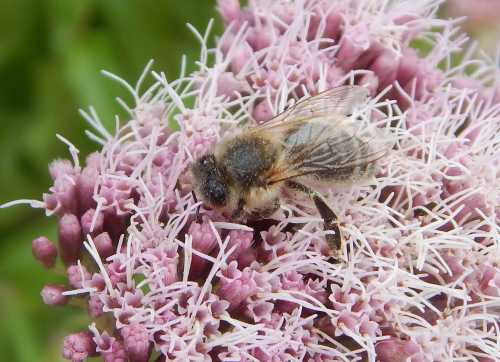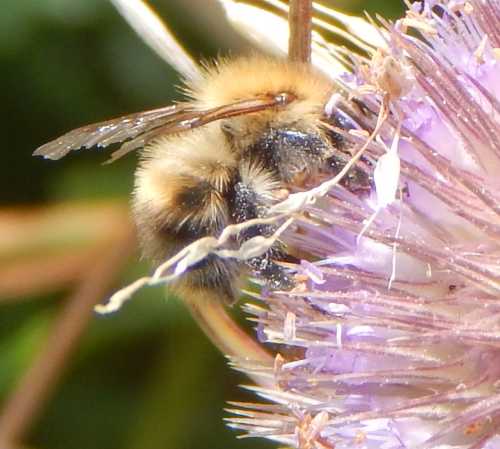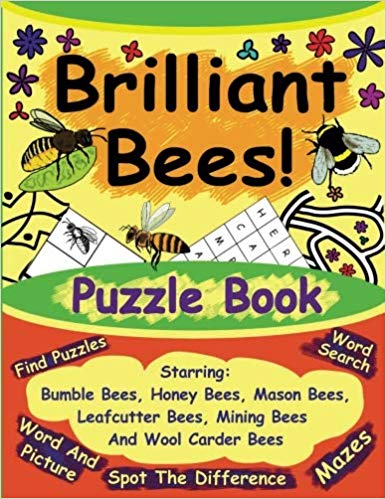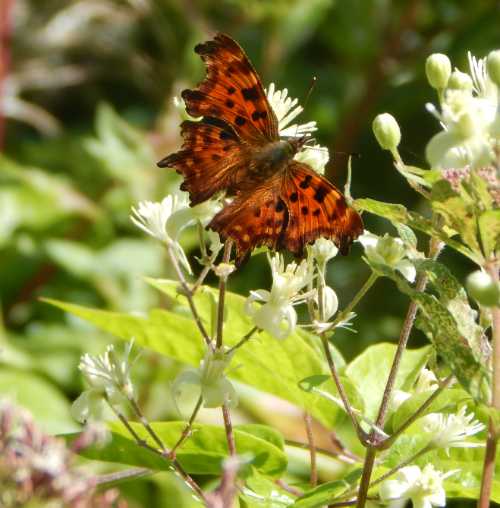How Is Bee Pollination Essential To Human Health?
That bees pollinate what might be considered many of the tastiest foods in our diets, is well known.
From the vitamin-packed blueberries we pile onto our pancakes, to the nutritious nuts, apples, beans and peas that appear on our plates, in our snacks, pies and muffins, the list of fruits, nuts and vegetables pollinated by our furry buzzing friends, the bees (and other pollinators), is a long one.
However, research from a variety of sources additionally confirms that bees pollinate not only some of the tastiest foods, but also the most nutritious parts of our diet, providing a direct link between bee pollination and human health.
Bees and human health: how bee pollination is essential to well-being
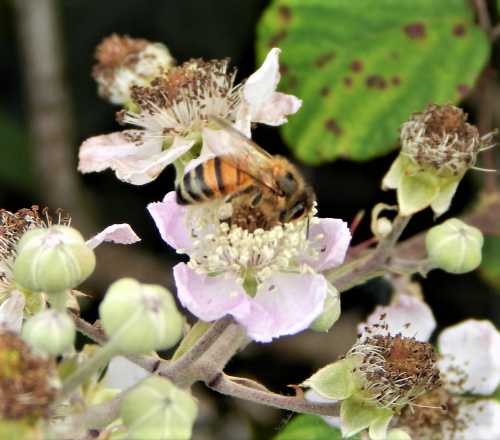 Honey bee on blackberry flower. Blackberry fruits are rich in vitamin C.
Honey bee on blackberry flower. Blackberry fruits are rich in vitamin C.There are three main aspects to this topic:
1. How pollinators improve nutrient value of foods
That pollinators may improve the nutrient value
of the crops they pollinate.
2.
Crops dependent on pollinators for growth and production
That crops depend (partially or completely) on
pollinators in order to develop the fruits, nuts and seeds which are in turn
consumed by humans (and indeed other animals).
3. Pollinators improve crop quality and longevity
This is relevant because less food wastage means more people are able to access nutrient-rich foods before they end up in landfill.
This is also increasingly relevant in an ever growing world population, because less wastage means a more efficient use of land space for crop growing.
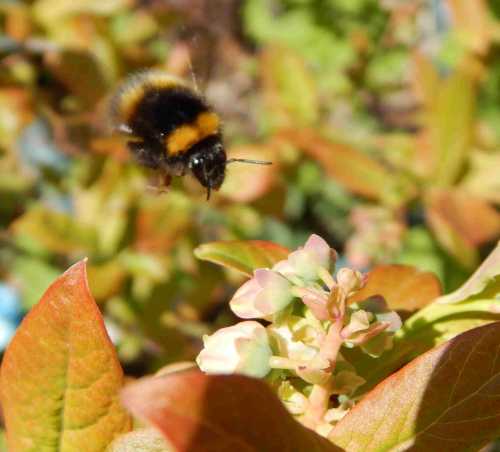 Blueberries benefit especially from wild pollinators, including bumble bee and mason bee species.
Blueberries benefit especially from wild pollinators, including bumble bee and mason bee species.
1. Pollinators improve the nutrient value of the crops they
pollinate
There appears to be limited research in this area, but it is probably a topic worthy of further investigation.
However, Garret et al (2014) have found that insect pollination improves the nutrient value of apples.
2. Crops dependent on pollinators for growth and production
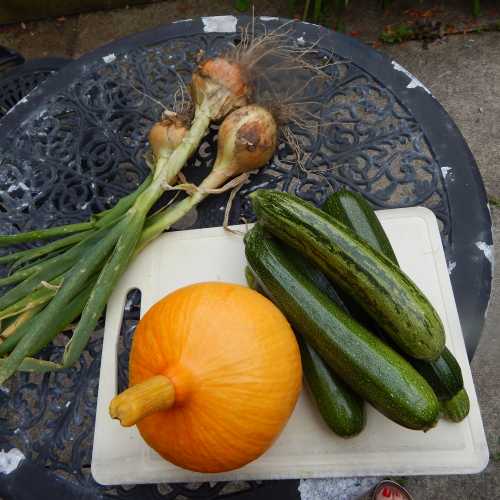 3 food plant crops that benefit from pollinators
3 food plant crops that benefit from pollinatorsPollinators help the onion plant to produce more seeds that can be sown for crops.
Squashes and courgette plants are dependent on bees to produce fruits.
A number of studies highlight evidence that pollinators may have a beneficial impact on nutrition security, because thanks to pollination, they guarantee the availability of essential macro- and micronutrients in the human diet.
Klein et al (2011) assessed worldwide data on more than 150 leading global crops from 1997 to 2007, comparing the nutrient value of those crops requiring pollinators (partially or entirely dependent), and those crops entirely independent of pollinators (which included bee species (the largest group by far), hoverflies and other flies, wasps, thrips, beetles and birds) .
Interestingly, for their analysis, a crop was considered pollinator-independent even if pollinators helped to increase seed production, but did not directly result in an increase in edible plant material.
In one sense, I wonder whether it was a good idea to exclude the seed element, given the trend in eating edible seeds, plus the importance of seed harvesting for food security.
A further calculation omitted from this analysis if plant food for livestock, such as alfalfa, which of course is pollinated by bees.
Klein et al's findings are a significant reminder of the value of pollinators to human diet, because good health is not merely about how much is eaten, it is about the nutrient value of what is eaten.
- 98% of the available vitamin C comes from animal-pollinated plants, primary citrus and other fruits and vegetables.
- More than 70% of vitamin A and 98% of each of the carotenoids cryptoxanthin (provitamin A) and lycopene are found in crops that are dependent or partially dependent on pollinators.
Klein et al note that vitamin A is one of the most prevalent deficiencies worldwide and is responsible for up to 500,000 annual cases of irreversible blindness in children worldwide. - A large portion of the dietary vitamin E is present in plants that require pollinators. The primary role of vitamin E is as an antioxidant; and Klein et al note that higher intakes of vitamin E are associated with lower cardiovascular disease (CVD) risk.
- Pollinators help increase the yields of crops providing high nutrient value.
For example 58% of calcium and 62% of fluoride are derived from plants with yield increase due to pollinators, such as beans, but also strongly pollinator dependent plants such as fruits and nuts (including almond).
Below is a summary of some of the nutrients assessed, and degree of dependence on pollinators. See the full nutrient / pollination table.
Nutrient derived from crop | Pollinator Involvement (%) | Comment | ||
|---|---|---|---|---|
| No pollinators | Partial involvement | Pollinator dependent | ||
| Protein | 83.43 | 13.57 | 3 | |
| Fat | 26.02 | 66.98 | 7 | Eilers et al: 74% of globally produced lipids are present in oils from plants promoted by animal pollination. |
| Vitamin A | 28.71 | 30.26 | 41.03 | Assists the skin, vision, and immune system. Present in peppers, apricots, squashes, mangoes. |
| Lycopene | 0 | 56.67 | 43.33 | Found in tomatoes, watermelon, pink grapefruit. Research is ongoing to assess its potential in reducing cancer risk. |
| α-Tocopherol | 63.73 | 28.94 | 7.33 | Belonging to the E group of vitamins. Anti-oxidants. α-Tocopherol helps promote immune system. Sunflower seeds and almonds are especially rich sources. |
| β-Tocopherol | 0.63 | 72.5 | 26.87 | |
| γ-Tocopherol | 32.92 | 52.66 | 14.42 | |
| δ-Tocopherol | 14.87 | 62.50 | 22.63 | |
| Vitamin C | 6.99 | 73.37 | 19.64 | Powerful anti-oxidant found in a wide range of fruit & vegetables pollinated by bees, e.g. oranges, apples, strawberries, peas, many more. Promotes wound healing, helps body fight infection |
| Vitamin B9 (folate) total | 55.49 | 37.19 | 7.32 | Vitamin B (especially folic acid) is crucial in pregnancy. |
| Calcium | 42.4 | 48.49 | 9.11 | Important for bone health. Found in oranges, beans, almonds. |
| Iron | 70.66 | 23.14 | 6.2 | Important for healthy blood. Present in beans, peas. |
| Potassium | 72.24 | 20.93 | 6.33 | Necessary for functioning of cells, muscles & nerves; regulates heartbeat. Present in pumpkins, peas, beans, watermelon, oranges, apricots, grapefruit, zucchini. |
The importance of pollinators to nutrition is perhaps of even more significance when considering the plight of some of the world's poorest countries, and the ability of their people to access nutritious foods.
For example, most staple crops providing most of the calories in the human diet are wind pollinated (e.g. corn, potatoes, rice) but Klein et al point out that much of the diverse nutrient value in those crops is lost during cooking or/and processing or preservation.
In the US, this issue is rectified for wheat by heavily fortifying wheat flours, nevertheless, 2/3 of the population globally does not have access to fortified grains.
In such cases, pollinated plant crops may be vital for plugging deficiency gaps in staple foods.
One example of this are the B vitamin, especially folic acid, found in fortified grains that are crucial in pregnancy. Klein et al found that globally 55% of available folate is present in crop plants that at least partially, require pollination.
They comment:
“ Dependence on these staple crops due to food system failures and declines in diet diversity are responsible for micronutrient deficiency (‘Hidden Hunger’) in over two billion people worldwide, especially in underprivileged areas.”
3. Pollinators improve crop quality and longevity
A number of studies show that pollinators can help improve not only the yield, but also the quality of the fruit and increase the shelf life.
An improvement in quality can result in fewer defects, making it easier for a farmer to sell the crops. It can result in less spoilage of fruits and longer shelf life, thus resulting in less wastage.
Again, this is worth considering within a context of nutrition deficit for a large part of the world's population.
For example, research has shown that bee pollination improves the quality of apple crops, and can result in heavier fruits, sweeter apples (having a higher sugar content) and ensures a longer shelf life.
Similar findings have been found for strawberries, whilst pollination by bees results in fewer defects in watermelons, as well as increased abundance.
If we lose nutritious foods due to pollinator decline, can dietary supplements take their place?
The problem with such an idea is that the plants harvested to create the supplements may also rely at least in some part, on pollination by bees and other pollinators, for fruit, nut and/or seed development.
For example, Klein et al point out that 90% of flowering tropical plant species are pollinator dependent, and many supplements are derived from flowering, pollinator-dependent plants.
Conclusion: bee pollination is essential to human health
The link between bees (and other pollinators) and human well-being perhaps goes deeper than many people realize.
As naturalist, John Muir once said:
“When one tugs at a single thing in nature, he finds it attached to the rest of the world.”
Resources
- Eilers EJ, Kremen C, Smith Greenleaf S, Garber AK, Klein A-M (2011) Contribution of Pollinator-Mediated Crops to Nutrients in the Human Food Supply. PLoS ONE 6(6): e21363. https://doi.org/10.1371/journal.pone.0021363
- Garratt, M. & Breeze, Tom & Jenner, N. & Polce, Chiara & Biesmeijer, Jacobus & Potts, Simon. (2014). Avoiding a bad apple: Insect pollination enhances fruit quality and economic value. Agriculture, Ecosystems & Environment. 184. 34–40. 10.1016/j.agee.2013.10.032.
- Gerster H. The potential role of lycopene for
human health. J Am Coll Nutr. 1997 Apr;16(2):109-26. doi:
10.1080/07315724.1997.10718661. PMID: 9100211.
- Story EN,
Kopec RE, Schwartz SJ, Harris GK. An update on the health effects of tomato
lycopene. Annu Rev Food Sci Technol. 2010;1:189-210. doi:10.1146/annurev.food.102308.124120
- Harvard University - The importance of potassium
- Oregon State Education - Micronutrient Information Center
If you found this page helpful or interesting, I'd really be grateful if you would share it with others - if not this page, perhaps another, such as Gardening For Bees.
Thank you so much :) .
